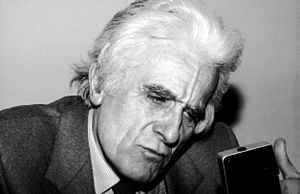Manuel Tuñón de Lara facts for kids
Quick facts for kids
Manuel Tuñón de Lara
|
|
|---|---|

Tuñón de Lara in 1982
|
|
| Born | September 8, 1915 |
| Died | January 25, 1997 (aged 81) |
| Alma mater | Universidad de Madrid |
| Occupation | Historian and professor |
| Employer |
|
| Political party |
|
| Awards | Gran Cruz de la Orden Civil de Alfonso X el Sabio (1996) |
Manuel Tuñón de Lara (1915–1997) was an important Spanish historian. He spent many years teaching and writing about Spain's past, especially its social and political changes in the 19th and 20th centuries. His work helped many people understand the history of the working class and the challenges Spain faced.
Contents
Who Was Manuel Tuñón de Lara?
Manuel Tuñón de Lara was a well-known historian and professor from Spain. He was born in Madrid in 1915 and lived until 1997. He dedicated his life to studying and teaching history, focusing on modern Spain.
Early Life and Education
Manuel Tuñón de Lara was born in Madrid on September 8, 1915. He studied law at the University of Madrid. He finished his degree in 1936.
When he was younger, in 1932, he joined a group called the Communist Youth Union. Later, in 1937, he became a leader in another group, the Unified Socialist Youth. He even joined their main committee. After the Spanish Civil War ended, he was held in a detention camp for a period.
Life in Exile: Paris Years
In 1946, Manuel Tuñón de Lara had to leave Spain. He went to Paris, France, to avoid being arrested because of his political activities. While in Paris, he continued his studies in history. He also wrote many articles for different publications around the world. These publications were often connected to communist ideas.
In 1964, he became a professor at the University of Pau in France. He taught Spanish history and Spanish literature there. From 1970 to 1980, he organized special meetings called Colloquiums on the Contemporary History of Spain. These meetings were very important. They encouraged people to study social history, which looks at how everyday people lived. Many scholars from Spanish universities came to these meetings to share ideas and have discussions.
Return to Spain and Teaching
After Francisco Franco, the dictator of Spain, died, the dictatorship ended. Manuel Tuñón de Lara was then able to return to Spain. He continued his teaching career there. He became a professor at the University of the Balearic Islands and later at the University of the Basque Country.
Manuel Tuñón de Lara had four children: Sergio, Elena, José Manuel, and Paloma. He passed away in Leioa, Spain, on January 25, 1997.
What Did He Write?
Manuel Tuñón de Lara wrote many books and articles about Spanish history. His works covered different periods and topics, helping to explain Spain's past to a wider audience.
Key Books and Studies
- Espagne (1955)
- From Incas to Indios (1956)
- El movimiento obrero en la historia de España (1962)
- Variaciones del nivel de vida en España (1965)
- Introducción a la historia del movimiento obrero (1965)
- La España del siglo XX (1965)
- Antonio Machado, poeta del pueblo (1967)
- Medio siglo de cultura española (1970)
- Estudios sobre el siglo XIX español (1971)
- Metodología de la Historia social de España (1973)
- La España del siglo XIX (1974)
- La Segunda República (1976)
- Luchas obreras y campesinas en la Andalucía del siglo XX : Jaén (1917-1920) : Sevilla (1930-1932) (1978)
- España bajo la dictadura franquista (1980)
- Tres claves para la Segunda República (1985)
- España: la quiebra de 1898 (1986)
- Historia de España (editor) (1988)
- Comunicación y cultura durante la II República y la Guerra Civil (1990)
See also
 In Spanish: Manuel Tuñón de Lara para niños
In Spanish: Manuel Tuñón de Lara para niños
 | Frances Mary Albrier |
 | Whitney Young |
 | Muhammad Ali |

